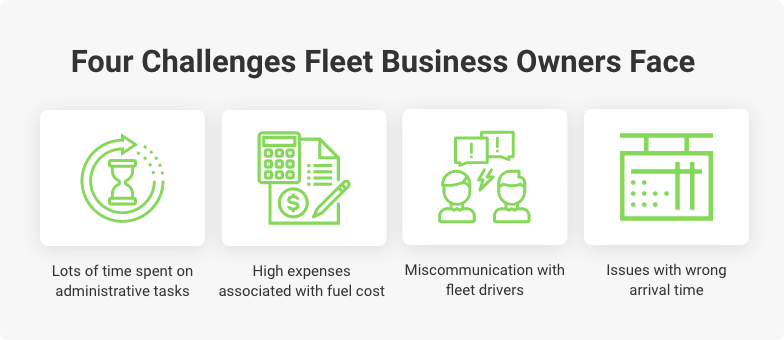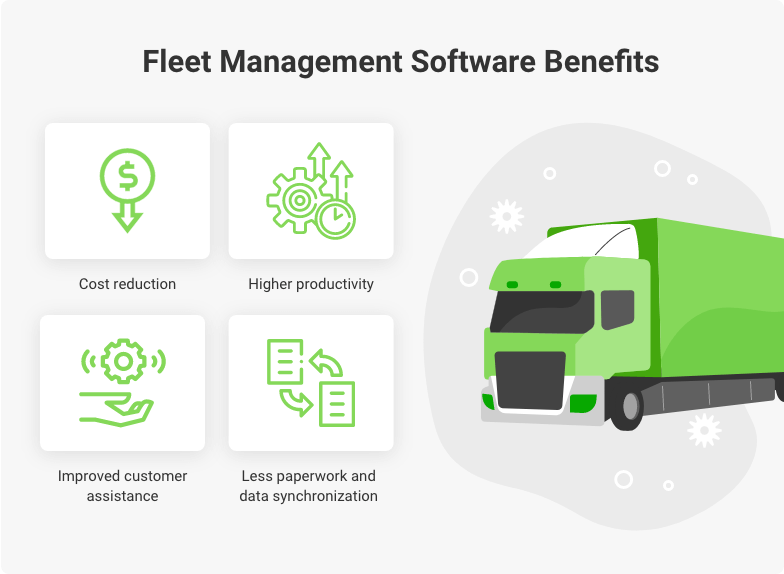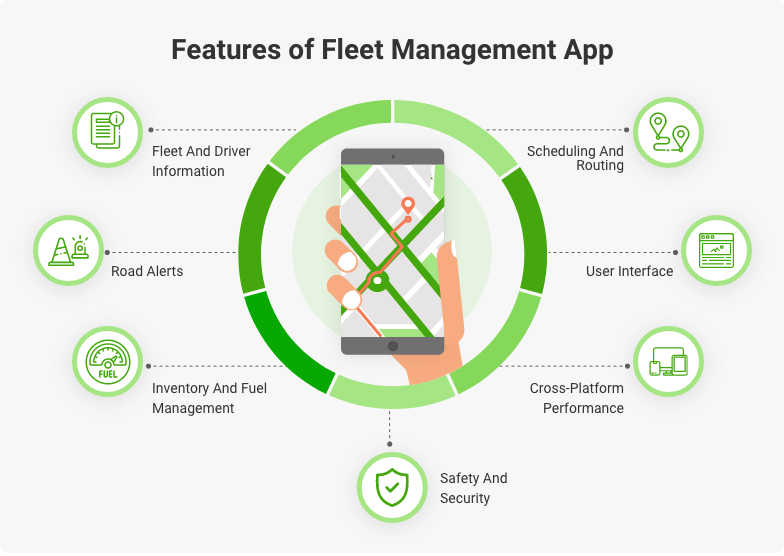Revolutionizing Fleet Management with Mobile Applications
Fleet management mobile apps are powerful software solutions designed to streamline and optimize the management of vehicle fleets for businesses. Their primary objective is to enhance fleet performance, reduce operational costs, and ensure the satisfaction of drivers and customers. These apps facilitate the collection, storage, tracking, and utilization of vital information related to fleet operations, logistics, and team members.
Key Challenges Faced by Fleet Business Owners
Running a fleet business presents several daily challenges that can significantly impact performance, productivity, and ultimately, profitability. Here are some of the primary issues that fleet business owners encounter regularly, all of which can be effectively addressed through the implementation of a robust fleet management application:

Challenges in Fleet Management
Excessive Administrative Tasks: According to Entrepreneur, nearly half of fleet managers spend valuable time on administrative tasks like invoicing, quoting, task performance evaluation, client communication, and expense management. This diverts resources away from core transportation activities.
High Fuel Costs: Fuel expenses are a significant part of fleet budgets. Entrepreneur’s survey indicates that 34% of fleet managers believe fuel costs are higher than necessary. Monitoring fuel consumption and driver behavior can help identify cost-saving opportunities.
Communication Issues with Drivers: Communicating with drivers, especially when they’re on the road, can be challenging. Email, SMS, or phone calls may not always be effective, impacting schedules and productivity.
Incorrect Arrival Times: Over 60% of fleet managers struggle to meet delivery schedules, leading to customer dissatisfaction and harm to a company’s reputation. Customers expect precise delivery times.
Benefits of Fleet Management Software
Before fleet management systems, tasks like fuel tracking and scheduling were managed on paper. Fleet management software has transformed the industry by improving performance, reducing costs, and returning control to business owners. Here are key reasons why creating a vehicle tracking application is a smart move:

Benefits of Fleet Management Software
1. Cost Reduction: Fleet management software can significantly reduce maintenance costs by optimizing routes, providing traffic updates, tracking repair history, and optimizing schedules, saving both time and money.
2. Improved Customer Assistance: Business owners and managers can track vehicle locations in real-time, enabling them to provide customers with accurate delivery progress updates and choose the closest vehicle for efficient service.
3. Higher Productivity: Fleet data analysis helps identify efficient vehicles with lower maintenance costs. Advanced management apps utilize machine learning to predict maintenance needs, preventing accidents and aiding in long-term fleet decisions.
4. Streamlined Processes: Modern fleet management systems integrate Customer Relationship Management and accounting functions, reducing the need for redundant data entry. This digitalization allows personnel to focus on problem-solving and analysis, increasing workforce efficiency.
Key Features for a Car Fleet Management App
A comprehensive car fleet management app should include the following essential features:
- • Vehicle Tracking
- • Route Planning
- • Traffic Updates
- • Maintenance History Tracking
- • Schedule Optimization
- • Real-time Location Data
- • Customer Progress Updates
- • Machine Learning Algorithms
- • Data Integration for Reduced Paperwork
- • Customer Relationship Management
- • Accounting Functions

Fleet and Driver Information
Managing a fleet becomes simpler with access to information about vehicle conditions, specifications, repair history, and mileage. GPS technologies enable real-time data collection on vehicle location, distance traveled, and road maps.
Fleet management systems provide tools to monitor drivers’ files, performance statistics, licenses, and certifications. This information helps in selecting the best driver for specific shipments or vehicles. To keep drivers engaged and motivated, you can introduce a competitive aspect to their job by providing KPI reports and rewards programs.
Scheduling and Routing
Fleet management systems (FMS) assist in efficiently planning and monitoring cargo, schedules, and routes. FMS technology helps determine optimal routes by considering traffic conditions, destinations, and available gas stations. This not only reduces costs and ensures on-time deliveries but also enhances overall fleet performance.
Inventory, Inspection, and Fuel Management
Fleet management apps minimize downtime by recording and tracking vehicle-related information, cargo details, and other business processes. FMS also ensures compliance with inspection regulations and governmental laws. Additionally, the software monitors fuel consumption and expenditures to identify vehicles and drivers with low fuel efficiency.
Safety and Security
All fleet management software should include safety features to protect drivers and vehicles. These features may include theft alerts, remote control capabilities, and emergency assistance. Monitoring departure and arrival times, speed, and other performance indicators helps fleet owners protect against false accusations or theft. Data security through encryption and software protection is also crucial to safeguard user and company data.
Road Alerts
Sending real-time notifications about weather and road conditions, as well as alerts about changes, helps keep drivers informed and safe. Collecting and monitoring data in real-time allows for timely notifications regarding possible dangers, including accidents.
Cross-Platform Performance and User Interface
To ensure convenience and wider coverage, your application should run smoothly on both iPhone, iPad, and Android devices. It should feature a user-friendly and customizable interface for ease of use.
Creating a Fleet Management Application
To create a fleet management app, follow these steps:
- 1. Assemble a team of specialists, including project managers, business analysts, developers (iOS, Android, backend), UI/UX designers, marketers, and testers.
- 2. Create a detailed specification outlining the desired features and functionalities.
- 3. Design the user interface to be intuitive and user-friendly.
- 4. Develop the backend to implement the specified features.
- 5. Thoroughly test the application for bugs and issues.
- 6. Develop a marketing plan to attract businesses and generate revenue.
- 7. Appoint a project manager to oversee planning, scheduling, and progress monitoring.

Fleet Management Application Development [Step-by-Step]
FAQ
1. Custom vs. Generic Fleet Management Solutions: Which One to Choose?
Unlike generic Fleet Management Systems (FMS), custom software is tailored to the client’s specific needs and goals. Software designed to address specific problems is typically more effective than pre-built applications.
2. What Are the Advantages of Fleet Management?
Fleet management addresses various challenges, including controlling maintenance and fuel costs, improving safety, enhancing driver and customer satisfaction, providing real-time tracking, and extending fleet longevity.
3. What Is GPS Tracking?
A fleet management platform based on GPS provides real-time information about vehicles, including engine performance, vehicle speed, distance traveled, and driver behavior. This data is valuable for creating effective strategies.
4. How to Improve Fleet Management?
One of the most effective ways to enhance fleet management is by developing an application that digitizes documents, tracks vehicles and fuel usage, and improves driver and customer satisfaction.
